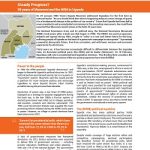This article was first published by Sunrise Newspaper and is republished here with the permission of the author
One of the few things that are agreeable to us all — those in government and those opposing it — is that growth is good and more of it is needed. In the context of Uganda, however, there are a number problems associated with our reported progress.
First, the reported “sustained” and “robust” growth of Uganda’s economy in recent past has not delivered the claimed social and economic benefits to a big majority of Ugandans. True, a few have benefited, but for the majority of Ugandans, particularly those outside government and the small group of its hangers-on, the growth is not being felt.
Variables such as salaries and incomes have stagnated, many have remained jobless, life satisfaction has flat-lined, social capital has been eroded, poverty and inequality have remained high and in some cases they are rising, and the environment has been degraded.
Second, the obsession by government officials — right from the President to the lowest cadre — of using growth in tax revenue as an indicator of economic progress is wrong. On several occasions, I have heard you, Mr. President, swaggering how the tax revenue collected by your government has increased exponentially from Shs. 500 billion in 1986 to Shs. 13,000 billion today.
Using the tax revenue growth as an indicator of “steady progress” is not good for a number of reasons: first all, tax revenue growth may actually signal increased liability on the few taxpayers which has limited their capacity to grow their enterprises and to create wealth.
Many Ugandans engaged in business and those earning some incomes have for long decried the high taxes levied on them. By quoting how tax revenue is growing rapidly you are actually adducing evidence that your government is over taxing us.
Regressive taxes
Secondly, tax has a negative multiplier to the economy, more so in economies such as ours where the tax system is regressive and accountability is very poor. It has long been proven by economists that people’s incomes, business profitability and generally GDP and GDP growth rate decrease whenever taxes charged by governments increase.
Since 1996 when Uganda’s taxes were made indirect through the introduction of value added tax (VAT), our tax system became regressive. It is taxing the poor more than the rich. For example, when 18% VAT is levied on a kilo of sugar that is sold at Shs. 3,500, a villager in Ruhinda (south-west Uganda) or somewhere in Pader (northern Uganda), earning Shs. 5,000 a day, will pay about 13% of his income to government, while a rich man in Kampala, earning Shs. 500,000 a day, will pay only 0.13%.
No wonder income inequality is widening every passing day. Ironically, it is the (overtaxed) rural poor that are supporting government while the ‘subsidised’ rich urbanites are tired of the “steady progress”. Of course the irony is plausible; the rural poor are actually paying less to government in absolute terms (total amount of money they pay).
So they feel government owes them nothing. And since government has provided a number of “free” things — universal primary education, free healthcare, free planting materials, etc. the villagers think that actually they are the ones who owe government, or more specifically President Museveni.
On the other hand, since Uganda’s tax base is narrow and urban oriented, the Kampala people and other urbanites feel the pinch of the tax, at least in absolute terms. Thus they feel that government ought to do more in terms of services provided.
Do we have private sector?
Another problem associated with our reported progress is the failure to nurture the much flaunted private sector. Uganda is being exhibited as having a private sector-led economic strategy. But careful scrutiny will reveal that actually the so-called private sector is nonfigurative.
What we have in Uganda are FDIs (dominating the fastest growing sectors such as manufacturing, telecommunications, banking, wholesale trade, and construction), some informal sector kiosks looking more for survival than doing business, and a few rent-seekers whose eye-catching lives would stop the moment the rent stopped flowing from government.
The so-called private sector is distributed as follows: Kampala Central Business District – one square kilometre in Kampala City centre (45%), central Uganda – towns around Kampala City (21%), western Uganda (14%), eastern Uganda (13%) and northern Uganda (7%).
Therefore, it goes without saying that development of the private sector in Uganda is mainly government driven. Government is a major player in business — it is government that actually owns the indigenous economy. That is why whenever government goes absent, for example, during the election time when focus and money goes into politics, businesses stop.
This must stop if we want to propel the private sector competitiveness and growth. The current structure promotes government patronage and the culture of hand-outs. Instead of the hand-outs given to selected individuals and companies, government should work to build the capacity of private sector through their umbrella organizations.
Bias towards industrialisation
I am glad that Ministry of Finance has finally realized what we have been singing for years and are starting to come out of their “dangerous obsession” with macroeconomic policies — the so-called provisioning of a conducive environment for the private sector.
This week, the ministry presented a draft “Private Sector Development Strategy” (PSDS) for the coming five years to stakeholders. I was part of the meeting that took a deep scrutiny of the strategy. I was impressed by a couple of things in the PSDS.
First, I was happy that the first PSDS in Uganda’s history is focusing on having a holistic approach to Uganda’s production value chains as well as on facilitating business linkages through both meso-level and micro-level interventions. This is a language that we have been missing dearly in Uganda’s economic vocabulary.
Secondly, the strategy is also intended to bias the private sector towards industrialisation. This is another piece of music to my ears. These are the things I have, for years, been singing. Uganda will not develop by having everyone turning into an “entrepreneur” selling Chinese hair and nails. Uganda will only develop if we nurture a few serious entrepreneurs into industrialists capable of employing millions of other Ugandans as factory workers.
Foreign investor fascination
However, we also noticed that the new strategy is anchored on a wrong motivation: to raise tax revenue. But we understood where the guys at finance were coming from. What do you do if your boss shows you that the main economic indicator he’s interested in is growth of tax revenue?
Mr. President, you need to redirect the strategic thinking of your government. The economy will only grow meaningfully if you focused your government’s resources and efforts on building the capacity of local entrepreneurs.
Stop your foreign investor fascination. Stop your tax revenue growth obsession. Stop your hand-out approach. Stop your supply-side focus on the economy, and emphasise more demand-side interventions as an incentive for producers and suppliers.
You also need to stop tagging your spending behaviour on availability of money. That attitude of “now that we have more money we can spend more” is the mother of indebtedness and low savings. Let us use growing tax revenues to create more wealth by investing in private sector production and productivity. Not to expand cabinet, parliament and other government consumers.
Ramathan Ggoobi is an Economist and Policy Analyst. He teaches economics at Makerere University Business School, where he heads an economic think-tank — MUBS Economic Forum.












